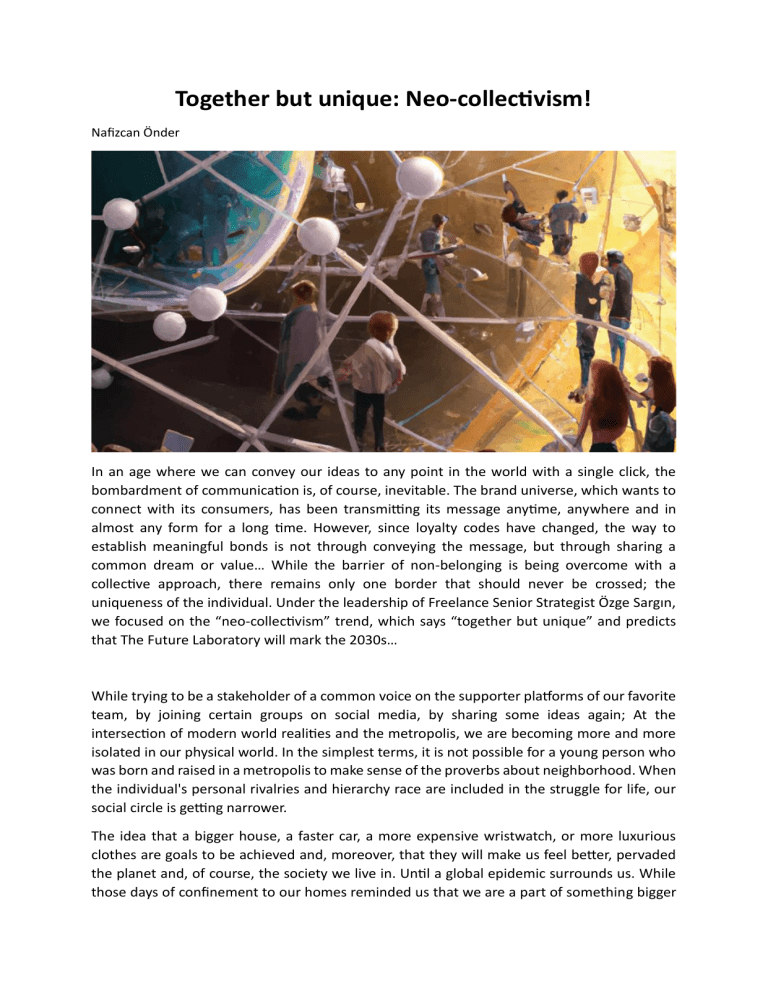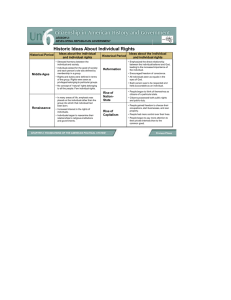
Together but unique: Neo-collectivism! Nafizcan Önder In an age where we can convey our ideas to any point in the world with a single click, the bombardment of communication is, of course, inevitable. The brand universe, which wants to connect with its consumers, has been transmitting its message anytime, anywhere and in almost any form for a long time. However, since loyalty codes have changed, the way to establish meaningful bonds is not through conveying the message, but through sharing a common dream or value… While the barrier of non-belonging is being overcome with a collective approach, there remains only one border that should never be crossed; the uniqueness of the individual. Under the leadership of Freelance Senior Strategist Özge Sargın, we focused on the “neo-collectivism” trend, which says “together but unique” and predicts that The Future Laboratory will mark the 2030s… While trying to be a stakeholder of a common voice on the supporter platforms of our favorite team, by joining certain groups on social media, by sharing some ideas again; At the intersection of modern world realities and the metropolis, we are becoming more and more isolated in our physical world. In the simplest terms, it is not possible for a young person who was born and raised in a metropolis to make sense of the proverbs about neighborhood. When the individual's personal rivalries and hierarchy race are included in the struggle for life, our social circle is getting narrower. The idea that a bigger house, a faster car, a more expensive wristwatch, or more luxurious clothes are goals to be achieved and, moreover, that they will make us feel better, pervaded the planet and, of course, the society we live in. Until a global epidemic surrounds us. While those days of confinement to our homes reminded us that we are a part of something bigger than ourselves, our collective priorities began to change and become more and more important. On the one hand, our concerns for the future of the planet reverberated more in a social dimension, on the other hand, the dream of a world that includes everyone by saying “all together or none of us” began to be established with a much louder voice. As our individual priorities gave way to collective priorities, our personal concerns to social and global concerns, arrows pointed to a common struggle and naturally collectivism. So what was the dead end of collectivism? Why did the world need collectivism in a new identity? Let's take a look at collectivism again for the answer to the questions... Collectivism 101 Collectivism represents an understanding that emphasizes cohesion between individuals and is characterized by prioritizing the group over the individual. So much so that in collectivist communities, relationships with other members of the group and interdependence between people play a central role in each person's identity, and “goodness” is defined by group and goal-directed actions. In collectivist communities, individuals do not define themselves as individuals but in relation to others. The community they belong to is a supra-identity that precedes their selves… It is possible to remember this approach from those who define themselves with the team they support, their hometown or a community they are a member of. Communication is often more indirect to avoid potential conflict or embarrassment within the community. Group loyalty is encouraged. Priority in decisions to be made always depends on what is best for the group. Working as a group and supporting others is essential. Shared goals are given more importance than individual pursuits. The rights of communities take precedence over the rights of the individual. Within all this definition, it does not seem possible to make room for the essence and personal boundaries of the individual… However, the world has no intention of giving up our “visibility”, our differences and our own voice, which have been won through great struggles. The pursuit of being a part of a whole with our uniqueness opened the door to neo-collectivism and gave birth to neo-collectivist communities… Brands and belonging in the dream of a better world While the isolated lives brought by the modern world prevail in the metropolis, the desire to feel belonging, to be a part of a community and, perhaps most importantly, to know that they are not alone, becomes stronger in almost every individual. Moreover, it is not possible to fight alone when we have social concerns rather than individual concerns in our minds. According to Edelman's annual Global Trust Barometer Report, consumers' trust in governments has been declining since 2020, and they now trust brands more than governments. While brands that do not remain indifferent to collective concerns and take a step are rewarded with “loyalty” by consumers, it is not difficult to foresee that those who do not take responsibility will not be able to stay in the future… The “neo-collectivism” trend, which is predicted to mark the 2030s, stands out as a solution where brands can benefit from the “non-belonging” insight. While bringing together consumers who share the same values and providing the confidence of being together, neocollectivist communities that celebrate the uniqueness of each member both nurture individuality and make us feel that we are not alone while facing the brutal competition and hierarchy of big cities. Brands can make a real difference by responding to the insight of the physical and emotional isolation of society by applying the neo-collectivist trend. Brands can increase the impact they create and the sense of belonging they create by establishing "micro-solidarity" oriented unions that bring together the consumers in the community over the values they share, rather than treating the members of the communities they create as homogeneous. Only in this way can they establish a meaningful relationship within the community and enable them to go beyond the individual isolation of consumers. Could belonging be the key to loyalty? Even though brands build their communication strategies by targeting the number of followers and interaction, and even when they reach all those statistical targets set at the beginning of the road, they do not create the meaningful connection sought… It is no surprise that customer loyalty hangs by a thread when there are no meaningful connections. What will change the game in this whole picture may be the concept of "belonging". What attractive price offer can rip you off from a community you feel like you belong in? Meet yourself before communities! Neo-collectivist communities today create themselves through common values by taking social responsibilities both in different business lines and in different fields. Individuals who want to join these communities must first of all have a high level of familiarity with their own values and skills. It should be underlined that it is not possible for you to feel belonging to these communities, which are expected to create a sense of belonging, considering that your personal values only match.


